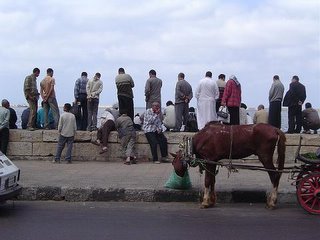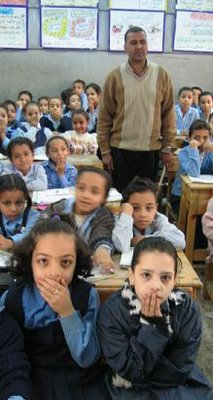Wednesday, December 28, 2005
Sunday, December 25, 2005
Netmakhtar Sawa
I was busy today and didn’t pay much attention to the world beyond my desk. The sound of the street outside did seem unusual, though, and I eventually realized there was loud music being played somewhere nearby. I thought it might be a new business ribbon-cutting thing—DeeJee, big matriarchs in black nursing Pepsi cans (7aga sa23a kanz) on maroon felt aluminum pipe chairs, some echoey Quran soon, the whole deal. But it was only noon; also I knew the neighborhood well and couldn’t figure out where the new shop could be, as I remembered the shop strip to be fully-occupied. I wondered how the straggly beard gratuitous-fus7a-speakers were taking it. Maliciously, I enjoyed considering the prospect of this bothering them to the point of confronting whoever it was blasting Loay into the cold, dusty, grey-sky air: “Ba2a ya3ni 3ashaan, 7abbeito ya leili yegraali ma garaali...”
I went out for a walk, thought I’d treat myself to some Rayeb and Kabab-flavored Funky (much better than that Mini-Cheetos crap). I bumped into 3amm Hamed, a smiley comforting old man from southern Se3eed and caretaker of the local mosque. I asked him what was going on. “7add byetgawwiz,” he said, pointing to a little gathering up the road, looking discontent. (Someone’s getting married).
 New bride’s trousseau on display. The large black object above the woman’s head is a speaker box; the yellow thing on the pillow pyramid is a frightened-looking stuffed bear.
New bride’s trousseau on display. The large black object above the woman’s head is a speaker box; the yellow thing on the pillow pyramid is a frightened-looking stuffed bear.
He shook his head and said something to the effect of “when will people ever get over those silly customs?” 3amm Hamed comes off as a traditional man, a man glad to honor the ways of his forebears. It might have been that, seeing the astonishment on my face, he intuitively thought to complement me—the friendly modern-looking neighbor—by denouncing the peculiar spectacle before us. That said, he did seem genuinely perturbed, and I would think anyone with some sense would at least have found the sight of a made bed by the side of a road odd. But I wondered how he defined these particular “people”. How was he himself different? Was he referring to Egyptians in general or just these urban baladi folk?
I told 3amm Hamed about George, an acquaintance of mine from Assiut. George had once told me about this relative of theirs from the countryside, an older man who refused to attend his own daughter’s wedding. “Ezay ragel mo7taram yeroo7 weysa22af weyed7ak we fee wa7ed 7ay-khosh 3ala bento lelet-ha?” (How can a self-respecting man go and celebrate knowing someone’s soon to sleep with his daughter?) According to George, it is customary in some communities for the father-in-law to maintain a sulky aloofness towards his daughter’s husband, as of her wedding day. It then falls upon the son-in-law to bury the hatchet by visiting his in-laws with his first-born child, seeking their blessings. I wonder if the fathers-in-law involved ever make it look like it’s the babies’ cuteness that softens their hearts. It would be nice to attend such a visit. I wonder if they actually say anything special, or if it’s all just body language, like some noble sort of isti3baat.
3amm Hamed shook his head again and wipe-slapped his palms with frustration. “Leh ya3ni yez3al, howa mish mitgawwezeen ya3ni? Dana lamma benti etgawwezet fere7t awi. Dalmafrood yeshkor el ragel 7atta 3ashan shaal 3anno 3aar!” (Why on earth should he get upset, they’re married now, aren’t they? I mean, I was so happy when my daughter got married. He should be thankful, even, to the young man for relieving him of this 3ar, this dishonor-potential!)
When I first looked there had been several women standing around the bed. Conveniently for me, they were gathered a few meters before “Sheikh” Sayed’s little grocery. Sayed is twenty years old and a brat but you couldn’t tell if you saw a photograph of him. So I walked towards his shop, passing by the bed-set spectacle trying to get as good a look as I could without seeming to ogle at the neighborhood women.
He asked where I was from, because he knew I was in Boulaq just for work. I said Alex and he asked if I knew Shaykh so-and-so (no), Dr. so-and-so (no), listing about five names before he mentioned Wagdy Ghoneim. I paused before I said yes. Slowly my face began to wilt and this made Sayed smile. “3aalem 3azeem,” he said (a great scholar). I shrugged and with my eyebrows tried to say you might think so, I might not. About 5 years ago an evangelical friend at university had taken me to a shop downtown and bought me two of his tapes as a gift: “Al 3elmaneya” (Secularism) for me and “Al Mar2a Fil Islam” (Women in Islam) for my girlfriend. The cover design on my tape consisted of an open skull exposing a serpent coiled around a brain, all set against a background of fire; I don’t remember what the other tape looked like, but my girlfriend did report some factual errors in its content. The man’s hysterical sermon had provided much amusement over the years, but it also left me with a serious concern about the growing appeal that Ghoneim’s grimy and resentful brand of Islam had for so many, including guys like Sayed.
We’d argued and debated over various issues before, Sayed and I, but today neither of us was in the mood. I nodded and end to our conversation, bought some mineral water and headed back to the office (where I eventually borrowed a camera phone and returned to take the picture). Walking back, I took one last look at the bed and realised I was just being a fiendish voyeur. Who wouldn't be? Was this not, after all, the very site of conjugal union?
For what it’s worth:
This past Ramadan a friend came back from a Mohandiseen extended-family iftar and told of how upset his father got with one of his second cousins. The twenty-something mother of two had confidently stated, before her breakfasting affluent clan, that having children was the only good reason to get married.
Wednesday, December 21, 2005
Tradition and Mazag
My friend got in trouble once, his mother had found an aromatic date-sized clump of flora* while emptying his trouser pockets for the wash. She knew what it was. The next day his father sat him down for a Talk.
Lovingly, he reassured my friend: "Lamma kont addak we fel gam3a zamaan ma7na konna 3aysheen bardo. Konna bno3od a3daat we beera w feseekh we banaat, ah, tab3an, maho tabee3i fil fatra di..."(When I was young and going to university we liked our good times too, you know. We'd get together and there'd be beer and feseekh* and girls, yes, it's natural at this age...)
*Salted putrid grey mullet. Egyptian delicacy said to date back millenia; usually consumed with fresh watercress, lettuce and squeezed lemons on Sham el Neseem (ancient feast of spring); categorised as impure by religious authorities--consumption is technically unlawful. Its taste combines extreme fishiness and the grating sting of sharp hard cheese.
Monday, December 19, 2005
Wednesday, December 14, 2005
Tuesday, December 13, 2005
About Shatby Fresh
If you're headed west along the corniche, towards Qait Bey, you might see this:

And if you walk over to the old wall and stand with the crowd, you might see this (check out the shoes):

They pull the loaded nets in through the wave-breakers (check out the shorts) and then sort their catch into tubs.

And if you're lucky you might even see Osta Hani the Shrimp Whisperer...

"Mish 3aref...7ases...7ases en 7ayati 7atetghayyar orayyib...enni 7a3mel 7aga 3azeema, 7aga gameela...zay makoon 3ayez aghanni aw amassil aw arsim bereesha kbeera kbeera w alwan zahya awi..."
"Ghona meen we rasmet meen ya 7maar...we lamma-bee3ak lelli wa2feen dol...eb2a wareeni 7atersem ezzay wenta marzoo3 fel taagin gatak neela f-khebtak..."







